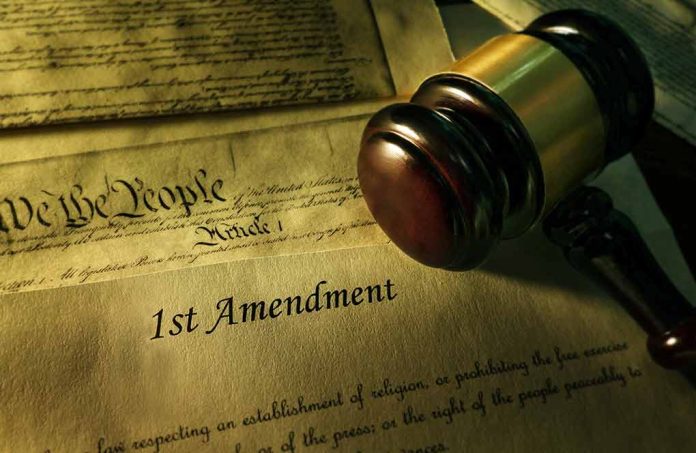
Our constitutional rights are once again in the spotlight as a federal appeals court prepares to rule on a potential TikTok ban.
At a Glance
- TikTok is contesting a US law that mandates its Chinese owner, ByteDance, to sell the app or face a ban.
- The law, signed in April, targets national security concerns over US user data potentially being exploited by the Chinese government.
- TikTok and ByteDance argue the law infringes on free speech rights and deny any links to Chinese authorities.
- The Department of Justice cites data concerns and potential propaganda use by the Chinese government in its defense.
- Free speech advocates argue that upholding the law could set a dangerous precedent for authoritarian regimes worldwide.
Court to Decide if TikTok Ban Violates First Amendment
The federal appeals court is set to make a significant ruling on whether a national TikTok ban contravenes the First Amendment. The contentious law compels ByteDance to divest from TikTok or face a U.S. ban, a mandate that TikTok and its users claim infringes on free speech rights. The government justifies the ban as a requisite for national security, citing the threat of Chinese surveillance. The court must deliver a crucial decision by December 6, offering a window for appealing to the Supreme Court before the law is enforced on January 19.
TikTok, which has over 170 million U.S. users, will present its case to a three-judge panel in Washington, DC. Eight TikTok creators, who rely on the platform for their livelihood, will join the company’s representatives. The Department of Justice will present its arguments, citing data concerns and potential propaganda use by the Chinese government. Courts typically defer to the president on national security issues, making the outcome of this ruling highly uncertain.
Bipartisan efforts to ban TikTok nationwide will be scrutinized Monday by a federal appeals court tasked with weighing whether axing the social media giant’s U.S. presence runs afoul of the First Amendment. https://t.co/uNtytalUnT
— KLBK News (@KLBKNews) September 15, 2024
Arguments From Both Sides
TikTok and ByteDance deny any links to Chinese authorities. ByteDance and TikTok sued to block the law in May, arguing that a ban would violate Americans’ free speech rights. “TikTok and ByteDance have always denied links to the Chinese authorities and have described the law as an ‘extraordinary intrusion on free speech rights.'” – On the other hand, the government claims the Chinese-owned platform poses a serious threat, potentially exposing American data to foreign surveillance.
“We shouldn’t be surprised if repressive governments the world over cite this precedent to justify new restrictions on their own citizens’ right to access information, ideas, and media from abroad,” said Xiangnong Wang, a staff attorney at Columbia University’s Knight First Amendment Institute.
The law signed by President Biden in April is aimed at ensuring national security. The Biden administration has received support from Republican attorneys general, former national security officials, and China-focused human rights groups. Experts predict the case could extend for months and potentially reach the Supreme Court. Free speech advocates emphasize that upholding the law could set a dangerous precedent for authoritarian regimes to justify their own restrictions on information access.
🚨🇺🇸TIKTOK BAN FACES COURT CHALLENGE OVER FIRST AMENDMENT
A federal appeals court will hear arguments on whether banning TikTok violates the First Amendment.
The Biden administration signed a law requiring TikTok's parent company, ByteDance, to divest the app or face a ban by… pic.twitter.com/FIlwUaegHJ
— Mario Nawfal (@MarioNawfal) September 16, 2024
Possible Impacts on Social Media and Free Speech
The ruling could reshape the landscape of social media and free speech in America. TikTok states that divestment is not feasible and would lead to the app shutting down by January 19 if the law is not blocked. “Even if divestiture were feasible, TikTok in the United States would still be reduced to a shell of its former self, stripped of the innovative and expressive technology that tailors content to each user,” The government has submitted classified information in court filings, which TikTok has asked to be rejected or reviewed by a district judge.
The Justice Department claims TikTok has taken direction from the Chinese government to censor content, though no evidence of this in the U.S. has been provided. TikTok proposed a draft agreement to the government for third-party monitoring, but negotiations fell through in August 2022. Bytedance has stated TikTok is not for sale, despite interest from investors.
Sources:
- TikTok to begin appeal against being sold or banned in US
- TikTok heads to court in suit against U.S. law that could ban social media used by nearly half of Americans
- Will TikTok Be Banned in January? That Question Is Headed to Court.
- Government Has Extremely Heavy Burden to Justify TikTok Ban, EFF Tells Appeals Court
- TikTok sues U.S. government, saying potential ban violates First Amendment
- A national TikTok ban and the First Amendment









